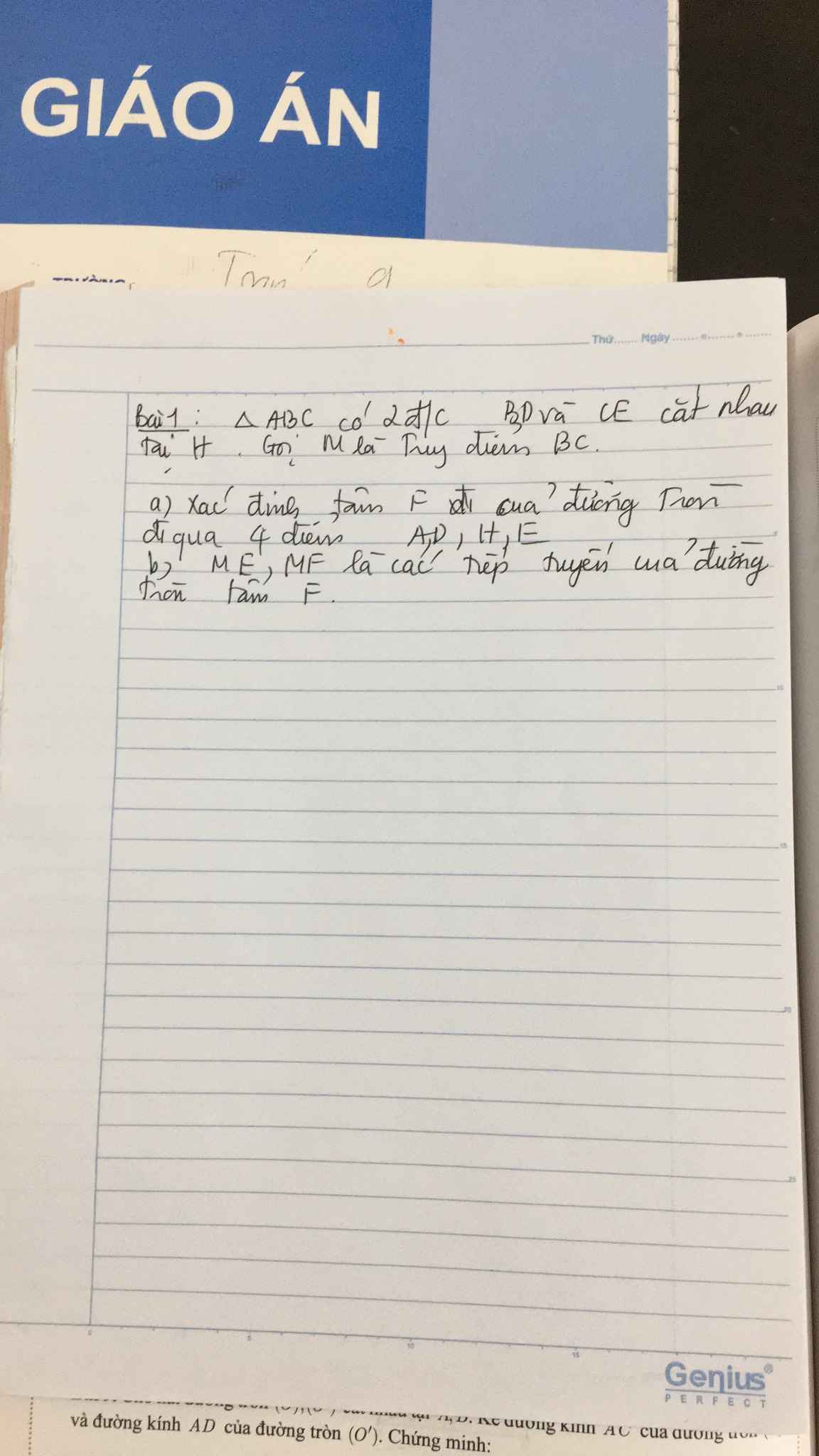
Hãy nhập câu hỏi của bạn vào đây, nếu là tài khoản VIP, bạn sẽ được ưu tiên trả lời.



ĐKXĐ: \(x\ne\pm3\)
a
Khi x = 1:
\(A=\dfrac{3.1+2}{1-3}=\dfrac{5}{-2}=-2,5\)
Khi x = 2:
\(A=\dfrac{3.2+2}{2-3}=-8\)
Khi x = \(\dfrac{5}{2}:\)
\(A=\dfrac{3.2,5+2}{2,5-3}=\dfrac{9,5}{-0,5}=-19\)
b
Để A nguyên => \(\dfrac{3x+2}{x-3}\) nguyên
\(\Leftrightarrow3x+2⋮\left(x-3\right)\\3\left(x-3\right)+11⋮\left(x-3\right) \)
Vì \(3\left(x-3\right)⋮\left(x-3\right)\) nên \(11⋮\left(x-3\right)\)
\(\Rightarrow\left(x-3\right)\inƯ\left(11\right)=\left\{\pm1;\pm11\right\}\\ \Rightarrow x\left\{4;2;-8;14\right\}\)
c
Để B nguyên => \(\dfrac{x^2+3x-7}{x+3}\) nguyên
\(\Rightarrow x\left(x+3\right)-7⋮\left(x+3\right)\)
\(\Rightarrow-7⋮\left(x+3\right)\\ \Rightarrow x+3\inƯ\left\{\pm1;\pm7\right\}\)
\(\Rightarrow x=\left\{-4;-11;-2;4\right\}\)
d
\(\left\{{}\begin{matrix}A.nguyên.\Leftrightarrow x=\left\{-8;2;4;14\right\}\\B.nguyên\Leftrightarrow x=\left\{-11;-4;-2;4\right\}\end{matrix}\right.\)
=> Để A, B cùng là số nguyên thì x = 4.

a: Để B nguyên thì \(-7⋮x+3\)
\(\Leftrightarrow x+3\in\left\{1;-1;7;-7\right\}\)
hay \(x\in\left\{-2;-4;4;-10\right\}\)
b: Để A là số nguyên thì \(3x+2⋮x-3\)
\(\Leftrightarrow x-3\in\left\{1;-1;11;-11\right\}\)
hay \(x\in\left\{-2;-4;14;-8\right\}\)
Để A và B cùng là số nguyên thì \(x\in\left\{-2;-4\right\}\)

e) Ta có: x=-2
nên \(\dfrac{10}{a-3}=-2\)
\(\Leftrightarrow a-3=-5\)
hay a=-2
a) Để x nguyên thì \(10⋮a-3\)
\(\Leftrightarrow a-3\inƯ\left(10\right)\)
\(\Leftrightarrow a-3\in\left\{1;-1;2;-2;5;-5;10;-10\right\}\)
hay \(a\in\left\{4;2;5;1;8;-2;13;-7\right\}\)

a) Để A = 0 thì \(x-7=0\Leftrightarrow x=7\)( thỏa mãn ĐKXĐ )
Để A > 0 thì có 2 trường hợp :
+) TH1 : \(\hept{\begin{cases}x-7>0\\x+4>0\end{cases}\Leftrightarrow\hept{\begin{cases}x>7\\x>-4\end{cases}\Leftrightarrow}x>7}\)
+) TH2: \(\hept{\begin{cases}x-7< 0\\x+4< 0\end{cases}\Leftrightarrow\hept{\begin{cases}x< 7\\x< -4\end{cases}}}\Leftrightarrow x< -4\)
Để A < 0 thì có 2 trường hợp :
+) TH1: \(\hept{\begin{cases}x-7>0\\x+4< 0\end{cases}\Leftrightarrow\hept{\begin{cases}x>7\\x< -4\end{cases}\Leftrightarrow}7< x< -4\left(\text{vô lí}\right)}\)
+) TH2: \(\hept{\begin{cases}x-7< 0\\x+4>0\end{cases}\Leftrightarrow\hept{\begin{cases}x< 7\\x>-4\end{cases}\Leftrightarrow}-4< x< 7}\)
b) Để A thuộc Z thì x -7 ⋮ x + 4
<=> x + 4 - 11 ⋮ x + 4
Vì x + 4 ⋮ x + 4
=> 11 ⋮ x + 4
=> x + 4 thuộc Ư(11) = { 1; 11; -1; -11 }
=> x thuộc { -3; 7; -5; -15 }
Vậy...........

a, \(A=\frac{3\left(x-1\right)^2+12}{\left(x-1\right)^2+2}=\frac{3\left[\left(x-1\right)^2+2\right]+6}{\left(x-1\right)^2+2}=3+\frac{6}{\left(x-1\right)^2+2}\)
Để \(A\in Z\Leftrightarrow\left(x-1\right)^2+2\inƯ\left(6\right)=\left\{\pm1;\pm2;\pm3;\pm6\right\}\)
Mà \(\left(x-1\right)^2\ge0\Rightarrow\left(x-1\right)^2+2\ge2\)
\(\Rightarrow\left(x-1\right)^2+2\in\left\{2;3;6\right\}\)
Ta có bảng:
| (x - 1)2 + 2 | 2 | 3 | 6 |
| x | 1 | 2 | 3 |
Vậy...
b, Theo câu a ta có: \(\left(x-1\right)^2+2\ge2\Rightarrow\frac{1}{\left(x-1\right)^2+2}\le\frac{1}{2}\Rightarrow\frac{6}{\left(x-1\right)^2+2}\le\frac{6}{2}=3\)
Dấu "=" xảy ra khi x - 1 = 0 <=> x = 1
Vậy GTLN của A = 3 khi x = 1

a) Ta có :
\(A=\frac{3.\left(x-1\right)^2+12}{\left(x-1\right)^2+2}=\frac{3.\left(x-1\right)^2+3.2+6}{\left(x-1\right)^2+2}=\frac{3.\left[\left(x-1\right)^2+2\right]+6}{\left(x-1\right)^2+2}=3+\frac{6}{\left(x-1\right)^2+2}\)
Để A có giá trị nguyên \(\Leftrightarrow\)\(3+\frac{6}{\left(x-1\right)^2+2}\)\(\in\)Z \(\Leftrightarrow\)\(\frac{6}{\left(x-1\right)^2+2}\)\(\in\)Z \(\Leftrightarrow\)( x - 1 )2 + 2 \(\in\)Ư ( 6 )
\(\Rightarrow\)( x - 1 )2 + 2 \(\in\){ 1 ; -1 ; 2 ; -2 ; 3 ; -3 ; 6 ; -6 }
Lập bảng ta có :
| (x-1)2+2 | 1 | -1 | 2 | -2 | 3 | -3 | 6 | -6 |
| x | loại | loại | 0 | loại | \(\orbr{\begin{cases}2\\0\end{cases}}\) | loại | \(\orbr{\begin{cases}3\\-1\end{cases}}\) | loại |
Vậy x = { 0 ; 2 ; 3 ; -1 }
b) để A có giá trị lớn nhất \(\Leftrightarrow\)\(3+\frac{6}{\left(x-1\right)^2+2}\)có GTLN \(\Leftrightarrow\)\(\frac{6}{\left(x-1\right)^2+2}\)có GTLN \(\Leftrightarrow\)( x - 1 )2 +2 có GTNN
Mà ( x - 1 )2 \(\ge\)0 \(\Rightarrow\)( x - 1 )2 + 2 \(\ge\)2 \(\Rightarrow\)GTNN của ( x - 1 )2 + 2 là 2 \(\Leftrightarrow\)x = 1
Vậy A có GTLN là : \(\frac{3.\left(1-1\right)^2+12}{\left(1-1\right)^2+2}=\frac{12}{2}=6\)\(\Leftrightarrow\)x = 1

sorry, em mới học lớp 6